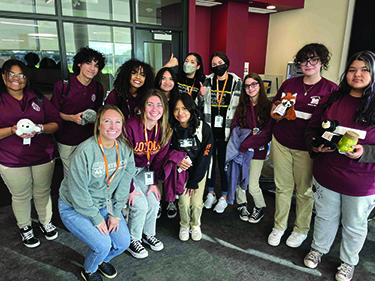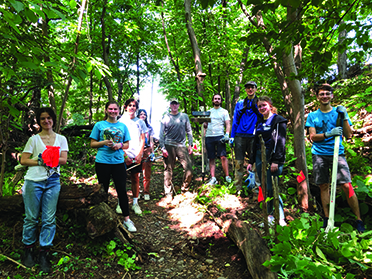Students at five U.S. universities recently raised awareness on health inequities involving climate change while inspiring action on climate justice.
Through the Student Champions for Climate Justice Awards, presented by APHA’s Center for Climate, Health and Equity, students held on-campus events this fall addressing climate justice. While event topics varied — from food insecurity and extreme heat to environmental racism and climate activism — they all had one thing in common: a commitment to addressing the inequitable impact climate change has on vulnerable communities. 
“We’re inspired by the work these students did in their communities and their passion for addressing climate justice,” said Katherine Catalano, MS, deputy director of APHA’s Center for Climate, Health and Equity. “We’re excited to continue supporting these types of projects on more college campuses across the country year after year.”
Among the event highlights:
• Students at the South Dakota State University created a website focused on the impact of climate change on public health issues, especially food insecurity, among Indigenous peoples in South Dakota. The website, called the “Climate Justice Experience,” includes a story map and quiz and was added to the curriculum of three courses at the university.
“South Dakota is one of the least populous states and has one of the largest Native American populations in the U.S.,” the students wrote in their project report. “These communities are at-risk and already face many hardships like poverty, higher rates of diabetes and heart disease and limited access to healthy foods, health facilities and education resources.”
• The Loyola University Chicago-Parkinson’s School of Public Health hosted a workshop for high school students that raised awareness of environmental racism and its impact on local communities and discussed opportunities for students to become involved.
“We hope that our students will continue to reflect and act on their own contributions to climate change while further advocating, volunteering and spreading  awareness of environmental racism and other climate injustices,” the public health students wrote.
awareness of environmental racism and other climate injustices,” the public health students wrote.
• Events held by students at the Georgetown Undergraduate Environmental Health Collaborative included a panel discussion addressing topics such as extreme heat and environmental burnout.
Students will continue their work by assisting in the production of Georgetown University’s second planetary health report card, and take part in a research project on soil pollution at local community gardens and its health implications for residents.
• At the University of Florida, two students hosted a webinar focused on climate justice and health equity in the Caribbean, Africa and Diaspora.
“As two women from the ‘global south,’ we have seen how the impacts of climate change have negatively affected our home regions and countries despite contributing very little towards it,” the students wrote. “As such, it felt important to us to shine a light on how these regions are impacted...and what can be done in the hopes of inspiring collective action toward creating a brighter future for us all.”
• A University of North Carolina at Charlotte team hosted a town-hall style discussion focused on advocating for sustainability on college campuses and beyond.
They also co-hosted an educational tree-planting event with the school’s Office of Sustainability to bring awareness to the connections between urban green space and health. Students launched an inaugural annual symposium to educate high school students on environmental health and social justice issues and explore tangible solutions.
“Educating young members of our communities about ways in which they can fight against climate change is the first step to building a more climate-healthy society,” the students wrote.
Read the full reports from the students online.
Top Picture Caption: The Loyola University Chicago-Parkinson’s School of Public Health hosted a workshop for high school students that raised awareness of environmental racism and its impact on local communities and discussed opportunities for students to become involved. (Courtesy Loyola University Chicago-Parkinson’s School of Public Health)
Bottom Picture Caption: Events held by students at the Georgetown Undergraduate Environmental Health Collaborative included a panel discussion addressing topics such as extreme heat and environmental burnout. (Courtesy Georgetown Undergraduate Environmental Health Collaborative)